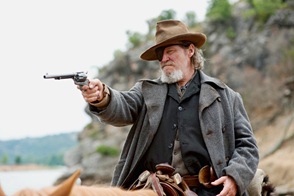 by Edward R. Mellow
by Edward R. Mellow
It’s been quite a year for Jeff Bridges – aside from winning an Oscar for Crazy Heart, he also starred in a sequel to Tron and the Coen Brothers’ latest, True Grit. One can’t imagine where it goes from here — he fixes the cable? Many justifiably contend that his role as Rooster Cogburn in the latter film may well be his finest performance to date. Just as the 1969 True Grit cemented the status of The Duke, the new version of the film will prompt people to similarly sanctify the Dude.
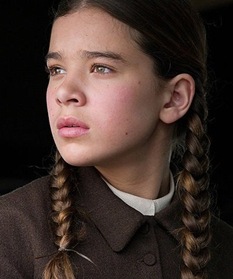 Yet all the attention afforded Bridges and his blindingly talented young co-star Hailee Steinfeld has obscured what may well be the most remarkable thing about this film: This is the first Coen Brothers film which seems designed to appeal to a wide audience. Ever. Aside from Intolerable Cruelty, of course–but that was a joint effort with others, and still a bit too peculiar to play in Peoria. Yet despite a few signature flourishes of weirdness, there’s nothing in True Grit inaccessible to even the most mainstream moviegoing mope.
Yet all the attention afforded Bridges and his blindingly talented young co-star Hailee Steinfeld has obscured what may well be the most remarkable thing about this film: This is the first Coen Brothers film which seems designed to appeal to a wide audience. Ever. Aside from Intolerable Cruelty, of course–but that was a joint effort with others, and still a bit too peculiar to play in Peoria. Yet despite a few signature flourishes of weirdness, there’s nothing in True Grit inaccessible to even the most mainstream moviegoing mope.
What’s more, there doesn’t seem to be a trace of that sine qua non of the Coenesque: the sense that the movie may be about something much more than what it appears to be–in other words, that it is actually a commentary on the here and now (or alternatively, the forever and always), reflected through the prism of the there and then. For instance, our beloved Big Lebowski may have been the greatest (and most prescient) statement ever made about where the United States (and by extension, 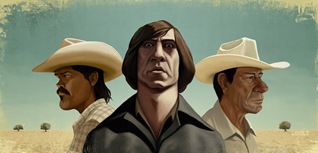 the world) found itself in the years leading up to millennial catastrophe. The brothers’ acclaimed “No Country For Old Men” bookended Lebowski, commenting on the post-9/11 desertscape the same country faced afterward. To varying degrees, just about every other film they’ve crafted can be argued to have acted as a subtle milestone/compass, telling us just how far down the trail the US could find itself in the whole durn human comedy. Part, anyway. Yet they always did so in a way that could easily be overlooked, should one care to do so.
the world) found itself in the years leading up to millennial catastrophe. The brothers’ acclaimed “No Country For Old Men” bookended Lebowski, commenting on the post-9/11 desertscape the same country faced afterward. To varying degrees, just about every other film they’ve crafted can be argued to have acted as a subtle milestone/compass, telling us just how far down the trail the US could find itself in the whole durn human comedy. Part, anyway. Yet they always did so in a way that could easily be overlooked, should one care to do so.
At least to this reviewer, there didn’t seem to be any manifesto behind the curtain in True Grit. That is, until a chat with his Western-loving mom raised some unread flags.
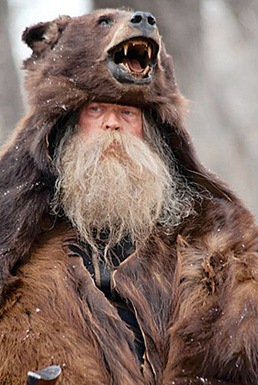 Afterward, over Mexican fare I had expressed my confusion over who the man in the bearskin was and why he was in the film. I figured he was a cognate of The Jesus in TBL, a bit of oddball levity meant to break up the second act a bit. But Mama, who was raised on the genre from a young age, pointed out that many westerns were concerned with speculators — people who traveled the open plains in search of harebrained money-making schemes. I realized then that she was right: the goofy medicine man was merely a Deepak Chopra of the Chaparral. The movie was in fact peppered with people like that, if generally more presentable. Hopeful that she saw through the gossamer veil, I pressed her for the hidden theme of the movie, but her answer was merely “crime doesn’t pay.”
Afterward, over Mexican fare I had expressed my confusion over who the man in the bearskin was and why he was in the film. I figured he was a cognate of The Jesus in TBL, a bit of oddball levity meant to break up the second act a bit. But Mama, who was raised on the genre from a young age, pointed out that many westerns were concerned with speculators — people who traveled the open plains in search of harebrained money-making schemes. I realized then that she was right: the goofy medicine man was merely a Deepak Chopra of the Chaparral. The movie was in fact peppered with people like that, if generally more presentable. Hopeful that she saw through the gossamer veil, I pressed her for the hidden theme of the movie, but her answer was merely “crime doesn’t pay.”
At first, I scoffed (not to her face, of course). All Coen Brothers films are about that, to some degree, but that’s only a linoleum veneer covering a vast foundation of implication.
Soon, however, I saw what she meant, or perhaps what I hope she meant in order that I could lend my own theory the weight of her experience rather than just my own idle speculation. The Coens had done it again! Though no reviewer to my knowledge has acknowledged this, it seems that they’ve taken a shot across the bow at the most recent American threat, that of an economic catastrophe precipitated by wild west-style villainy: Snake oil salesmen and prairie-mad schemes venturing capitally out into unchartered territory.
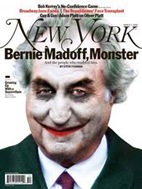
 This of course explains the fact that the hero of the film, a fourteen year old girl with a strict Protestant ethos, is inspiring not for just her backbone, but her skills in amateur law and accountancy.
This of course explains the fact that the hero of the film, a fourteen year old girl with a strict Protestant ethos, is inspiring not for just her backbone, but her skills in amateur law and accountancy.
When was the last time an audience cheered a hero for his or her facility with ledgers, balances and Latin? Just as they did with laziness in The Big Lebowski, the Coens have brought to light yet another unlikely type of heroism — that of those who can protect the common man against the red-ink rigamarole of speculator scofflaws who intend to defraud both investors and regulators with their holey writs. Mattie’s mission wasn’t just to avenge the wrongful death of her father, but to invoke the wrath of God (via his disguised one-eyed avatar, Rooster) upon what was in some ways an American Sodom, the now-glorified open country of 19th-century America. And, by extension, of course, our current Gomorrah Sachs and Bear-headed Stearns. Doesn’t anyone give a shit about the rules? It’s hard to give a shit in a province where there don’t appear to be any.
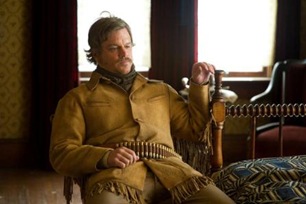 Given the yawning gap between a bunch of horse-riding gunslingers and bull-baiting bondslingers, it’s easy to forget that theft is a sin whether it travels a straight or convoluted path. And in a territory where there are few regulators to keep watch, we have to depend on often comically and unromantically upright citizens to protect us. Dizzy yet upstanding Rooster, plain and unsentimental Mattie, and dorky and determined LeBoeuf may not seem like obvious saviors at first, but, as in The Big Lebowski, we are forced again to implore, “what’s a hee-ro?” In a country where the President of the United States is chided by an overpopular but undereducated frontierswoman for being a “law professor” instead of a cowboy, we should all have cause to fear.
Given the yawning gap between a bunch of horse-riding gunslingers and bull-baiting bondslingers, it’s easy to forget that theft is a sin whether it travels a straight or convoluted path. And in a territory where there are few regulators to keep watch, we have to depend on often comically and unromantically upright citizens to protect us. Dizzy yet upstanding Rooster, plain and unsentimental Mattie, and dorky and determined LeBoeuf may not seem like obvious saviors at first, but, as in The Big Lebowski, we are forced again to implore, “what’s a hee-ro?” In a country where the President of the United States is chided by an overpopular but undereducated frontierswoman for being a “law professor” instead of a cowboy, we should all have cause to fear.
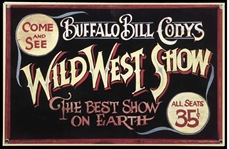 What True Grit has done for the Western is ironic in the best of the Coen tradition — it has helped take some of the brio out of one of America’s most cherished myths, that the Wild West was a place in which honor habitually triumphed. It reminds us that we should not labor under the same fiction by championing an under-regulated economic system.
What True Grit has done for the Western is ironic in the best of the Coen tradition — it has helped take some of the brio out of one of America’s most cherished myths, that the Wild West was a place in which honor habitually triumphed. It reminds us that we should not labor under the same fiction by championing an under-regulated economic system. 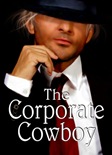 Crime in fact paid pretty well back in the Wild West. It must not be allowed to provide the same return on investment which it has over the last decade.
Crime in fact paid pretty well back in the Wild West. It must not be allowed to provide the same return on investment which it has over the last decade.
Whereas The Big Lebowski concerned the value of not getting involved and going with the flow, the Coen Brothers’ version of True Grit plays yang to its yin. If a fourteen year old girl can use logic and the law to avoid being fleeced by corrupt human paraquat, then we can take that hill with her and pick them off from high ground.
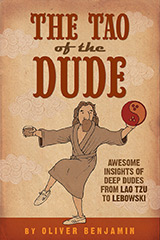

Edward R. Mellow is nothing if not an idealist. Dude bless him.
However, the heroes of the Bible (the Old Testament anyway) are equally flawed and vengeful in extracting judgment. They are the men and women for their time and place. As were people like Rooster in a land as lawless as Ye Olde West.
I have a few differences of perspective with your analysis. First is with the notion that either Mattie or Rooster are actually heroic. Mattie selectively ignores central parts of her “protestant ethos” when she seeks to force the hand of judgment, which in that ethos explicitly belongs to God, as illustrated by the well-known passage “‘Judgment is mine’ says the Lord” (Romans 12:19), not to mention Jesus’ instructions to “turn the other cheek”. She is no hero. And Rooster seems a scoundrel, reputed to be among Quantrill’s Raiders (which he seems to confirm), a group whose indiscriminate brutality and looting caused them to be as reviled as marauders by the Confederates they claimed to be aligned with as by the Abolitionists they were attacking (in the “Bloody Kansas” days shortly preceding the Civil War). The scene in which we meet him reveals that he shot an essentially unarmed man without warning, and later in the film he plans to shoot others in the back. Whether or not his targets were guilty isn’t the point (such wasn’t his place to decide in any case). It was a measure of expedience (to avoid a harder firefight), to be sure, but expedience at the expense of honor is hardly heroic. Rooster was no hero. LeBeauf was petulant and vaguely Machiavellian, also not really a hero. The flaws of other characters strike me as self-evident. Each of the main characters has their shining moments, but no deep redemption, no apparent recognition of their own misgivings.
Don’t get me wrong; I loved the movie, and consider their version a much more powerful telling. However, there are no heroes to be found in it, only errant humans, ripe with flaws, failings, and blindspots, as are we all. The point, as I perceive it, is not just that crime doesn’t pay (which actually I would express more as victimizing others, regardless of legal codification or execution, carries an unavoidable price); as you point out, that is merely a veneer. The deeper point I see is that vengeance also exacts its dues (most obviously portrayed in Mattie’s loss of her arm, and Rooster’s lost eye).
I always see the CB’s movies as not only markers of the American moment in which they were made, but also as meditations on what it mens to be a man in America. Mattie is brilliant and brave, but she is ultimately no match for the men with guns, even when she uses one herself.
She has welcomed the male solution to her problems and her loss and ends up snake bit — having fallen from the garden of blood innocence. Her fall is literal, and because of it, she loses everything — her horse and her life as a little girl/young woman and ultimately, her arm. She, like all that she represents — brilliant young femaleness, deep and abiding love of family, astonishing courage and a thirst for justice for the murder of her father — all are for naught and she grows into a cold, bitter, mutilated middle aged woman with no home, family or future. Sounds a lot like today to me. And it is all because of America’s fantasy of the old west and the guns that we continue to believe in and continue to bear today. There ain’t no heroes in America, but there sure are guns and mutilated, brilliant young women — see Gabby Giffords, the Octomom and yes, deformed and insane Sarah Palin. So — Jeff of course brings his huge heart and desperate talent to the basically helpless and weirdly moral Coburn, making him, if not a hero, at least someone who tries to do the least amount of harm he can within the hell that was/is the American belief in cowboy culture. God have mercy on us all.
After reading the article lots of thoughts crossed my mind, then, after reading the commentaries I need to sit back and re-think my viewpoints. Lots of heavy thoughts floating around here and there, lots of ins and outs. My nighttime will be busy sorting this all out.
Thanks guys!
I like your commentary, EllieDee, but I have to disagree with you about Mattie growing into a cold, bitter, middle-aged (heavens NOT THAT!) mutilated woman with with no home (she has one), no family (she mentions her sister, and surely burying Rooster in her family’s plot is a sign that she considers him family), and no future (what about her own life?) Why is it that women who choose not to marry are considered cold and bitter? We are not all the same, and some of us love to be alone, especially in a world filled with untrustworthy fools. As long as we allow woman to reach for only one ideal (mother/wife), we deny her humanity. Mattie is such a great character in my eyes, because she does the best with what she has, and chooses her own life.
BizzyLizzy — I am sorry that I didn’t take the time to say that not all women must be moms/wives to be whole and happy. I don’t think that. But in Mattie’s case, the lack of affect, her stiff bearing. her mutilated body, her stern and sad face — I believe are evidence of her “fall” — and in the end, to travel far to see the man who tried to talk her out of it all and did indeed save her life — whom she hadn’t seen in 25 years — to find he’s died just the day before…I don’t know, it just seems beyond sad. Remember earlier in the movie, after seeing so much hideous violence, she stares off into nowhere and mummers “I’ve seen horrible things” (paraphrase). I see Mattie as post traumatic stress syndromed, and it is the male world and the worship of the gun which destroyed her and has led us to where we are today. But of course, I agree with you about women who chose to lead their own lives. Of course I do — it should have been my point that Mattie did not choose anything past killing her father’s killer — effectively, her life ended with his. What a great movie, eh?
I thought it was great to see such a strong female lead in a film. We don’t get that too often and it’s great for little girls and young women in this country to have a more decent role model than Brittany Spears and Hannah Montana. So things didn’t end up all unicorns and rainbows for Mattie. That’s ok. It’s life. At least she stood up for herself, was intelligent and self-motivated, had self-confidence, and wasn’t a slut.
Was I supposed to read all of that? Come on…
I personally think it’s nice to see a man who’s neither a hero, nor an anti-hero. Rooster is just a man, with all the flaws, foibles and characteristics of a real human being. When it gets down to it, he’s a good man, which sets him apart in a society that’s swimming in greed and sin (conversely to the strong moral enforement of the protestant church at the time).
As for Mattie, she is indeed ‘heroic’ in as much as she manages to throw off the pre-defined shackles of her society, and with a strong christian ethic and sense of social and moral responsibility driving her forwards. It is the act not of striving for justice (or more accurately, vengeance) and her own grit and determination to do so, it is, yes, her ability to rise above what others thing she should be, and should ONLY be.
These two people are not our heroes, they are the heroes of the time, and merely a well-drawn representation of such, not the lone exceptions to the common rule.
I’ve heard from my special lady about some of the differences from the original book, so now it’s my turn to give it a read and see just what ol’ Charles Portis was ramblin’ on about when he came up with all this :)